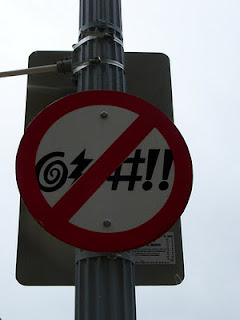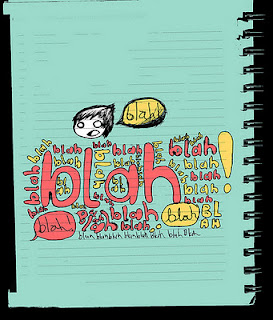After reading Andrew Churches' wiki post regarding the characteristics of 21st Century teachers, and while still thinking about a tweet I posted a while back, I want to share some evolving thoughts on effective teaching in today's complex educational world.
In my Twitter #edchat conversation a while back I said that "many new teachers think success comes from 'stuff'- resources, programs etc. Success will ONLY come from them and sound personal philosophy." Hey, let's face it... many teachers, new and old alike, are feeling a bit like Inspector Gadget lately; we are being pulled (the pessimists among us may say 'pushed') in many different directions as time marches on in education, and in the broader society we reflect. So how do we navigate these turbulent waters?
Relax. There are no emergencies in education. This personal maxim has served me well for a long time since adopting it from a former principal I had the privilege of learning from. True, there are a number of roles teachers need to play in order to keep up with the evolving disposition of the new-age learner, but rather than rue this challenge, why not accept it with excitement and enjoy the ride?

I agree with Andrew's above vision of the 21st Century Educator. Although today's teacher is most definitely all of these things, I believe contemporary teachers need to consider themselves primarily as collaborators within the learning process... a stark removal from traditional teaching perspectives where the teacher was first and foremost a provider of information. We are (need to be) much more than that for the brilliant young people evolution has provided us the good fortune to work with.
Teaching is about relationships... great teaching is absolutely not about the "stuff" (those resources, technologies, programs, textbooks etc.) that many associate as representing a good educational environment. Next fall as thousands of new North American teachers scramble to find the latest and greatest classroom tools to make their first year of teaching manageable and successful, let's reflect seriously on the fact that positive and effective educational environments aren't about teaching tools; they're about relationships... people working with people to establish the trust and commitment necessary in any successful relationship. Teaching and learning is a collaborative effort that we should be making together with students as opposed to a deliberate attempt by the teacher to contol, dictate and disseminate information.
We're hearing much about authentic learning lately, and we all know what Mr. Bloom would say about some of the transactional practise evident in today's classrooms... why can't we lighten up a bit and enjoy the ride as much as we would like our students to? I believe that when we make positive and authentic connections with students first, that the control many teachers crave will happen authentically and automatically. In the wise words of Nel Noddings, "it is obvious that children will work harder and do things — even odd things like adding fractions — for people they love and trust."
Let's stop worrying and concerning ourselves so much about the tools of our trade, and return to the roots of our craft. Let's tap into our higher order thinking skills and start working on regaining the creativity and optimism that comes from ideas, understanding that ideas can come from anywhere, including our students. Let's collaborate on the learning process by adopting an attitude of inquiry and discovery and getting on with Fourth Way ideologies of the future.
Let's relax and have fun doing what we have the privilege to do...
In my Twitter #edchat conversation a while back I said that "many new teachers think success comes from 'stuff'- resources, programs etc. Success will ONLY come from them and sound personal philosophy." Hey, let's face it... many teachers, new and old alike, are feeling a bit like Inspector Gadget lately; we are being pulled (the pessimists among us may say 'pushed') in many different directions as time marches on in education, and in the broader society we reflect. So how do we navigate these turbulent waters?
Relax. There are no emergencies in education. This personal maxim has served me well for a long time since adopting it from a former principal I had the privilege of learning from. True, there are a number of roles teachers need to play in order to keep up with the evolving disposition of the new-age learner, but rather than rue this challenge, why not accept it with excitement and enjoy the ride?

I agree with Andrew's above vision of the 21st Century Educator. Although today's teacher is most definitely all of these things, I believe contemporary teachers need to consider themselves primarily as collaborators within the learning process... a stark removal from traditional teaching perspectives where the teacher was first and foremost a provider of information. We are (need to be) much more than that for the brilliant young people evolution has provided us the good fortune to work with.
Teaching is about relationships... great teaching is absolutely not about the "stuff" (those resources, technologies, programs, textbooks etc.) that many associate as representing a good educational environment. Next fall as thousands of new North American teachers scramble to find the latest and greatest classroom tools to make their first year of teaching manageable and successful, let's reflect seriously on the fact that positive and effective educational environments aren't about teaching tools; they're about relationships... people working with people to establish the trust and commitment necessary in any successful relationship. Teaching and learning is a collaborative effort that we should be making together with students as opposed to a deliberate attempt by the teacher to contol, dictate and disseminate information.
We're hearing much about authentic learning lately, and we all know what Mr. Bloom would say about some of the transactional practise evident in today's classrooms... why can't we lighten up a bit and enjoy the ride as much as we would like our students to? I believe that when we make positive and authentic connections with students first, that the control many teachers crave will happen authentically and automatically. In the wise words of Nel Noddings, "it is obvious that children will work harder and do things — even odd things like adding fractions — for people they love and trust."
Let's stop worrying and concerning ourselves so much about the tools of our trade, and return to the roots of our craft. Let's tap into our higher order thinking skills and start working on regaining the creativity and optimism that comes from ideas, understanding that ideas can come from anywhere, including our students. Let's collaborate on the learning process by adopting an attitude of inquiry and discovery and getting on with Fourth Way ideologies of the future.
Let's relax and have fun doing what we have the privilege to do...





